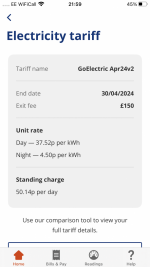Geek
Full Member
- Messages
- 1,009
Either sides of the Pennines around Halifax/Manchester diesel is that sort of price on some Morrisons or at Costco.Where's 'around here' @Geek ? You've got cheap diesel.
I'm interested how you convert litres of diesel to KWh, could you explain please? That's not a criticism, I am genuinely interested because you make a good economic point in favour of diesel. From what I have read on forums in the last couple of years, people generally have not much idea of the power in petrol / diesel versus the amount of electricity required to equal for example a 150HP ICE.
The conversion is fairly straightforward: it's 11.83 KWh per Kg and 0.846 kg per litre. So that works out about 10 KWh per litre.
https://www.engineeringtoolbox.com/fuels-higher-calorific-values-d_169.html is useful for this sort of thing

